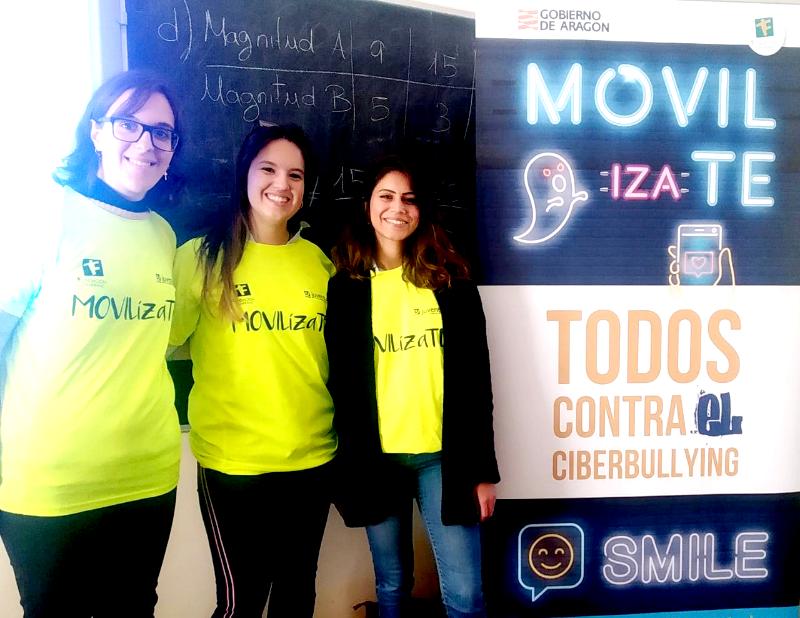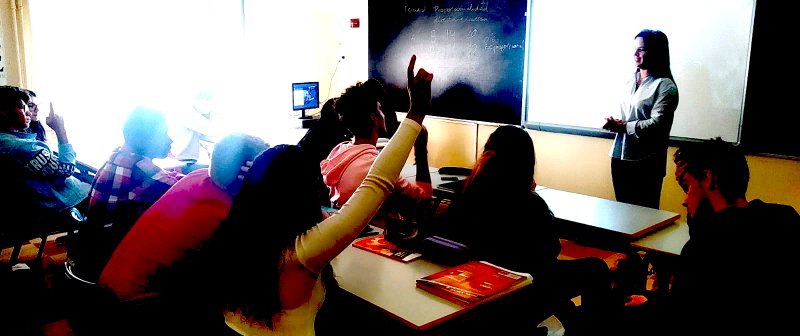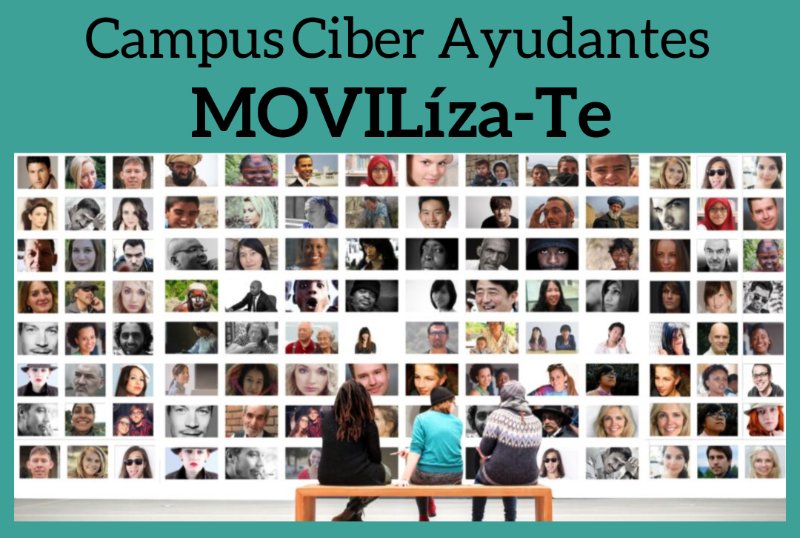Testimonies
MOVILízaTE – ACTIV8Become the protagonist of change |
 |
What is it?
«MOVILizaTE, STOP CYBER VIOLENCE» is a European project focused on preventing youth violence via smartphones and internet. Its aim is to empower young people who suffer from it, especially women.
We will select centres in each partners´ cities (Spain, Poland and Slovenia) in order to make workshops to give these young people some strategies in order to deal with cyber-bullying.
For these workshops, we will involve young people in the project design, during implementation and follow-up.
We will start with a survey for Spanish, Polish and Slovenian young people through the partners’ own channels, social networks and educational centres in order to obtain a sample of the existing general problems in relation to violence among young people and especially which is carried out through Internet or cyber-violence.
In the light of the results, we will draw up the appropriate training programme; it will consist of 18 workshops: each partner will involve three schools in the project that will hold 3 workshops per school. The number of studients in each one is 25 students each lasting 3 hours. Specialists in cyberbullying and computer security will be in charge of the training programme.
Moreover, the project will train 35 young Europeans girls and boys between 18-30 years old to lead the prevention of cyber-violence in their countries and their environment. Once more, we will hold a series of specific workshops in their cities; in July we will hold a sharing and training meeting during ten days in Poland with all of them, where everyone will be able to share their experiences and go a little further in their learning towards this leadership.
In this way, 250 young people (100 Spanish, 75 Piarist and 75 Polish) will benefit from this project whose aim is that they have an adequate use of mobile phones, developing their emotional intelligence and technical knowledge as internet users, thus preventing youth cyber-violence.

In addition, in this web we have different resources aimed at that young people who wish or need it.

Who is it for?
This project is aimed to teenagers and young people who want to receive training on a healthy digital use in their social networks.
If you need orienteering or any help related to cyberbullying or sexting, you can contact us at the following email: movilizate@fundacioncanfranc.org

Youth resources
Below you will find a series of resources from the different partner countries of the project:
- SPAIN
-
HELP PAGES
https://www.ciberbullying.com/
Youtube security center to prevent cyber-bullying: https://www.dailymotion.com/video/x5bwp4i
-
How to make safe video-callings: https://www.ambito.com/aplicaciones/como-realizar-videollamadas-seguras-y-evitar-el-zoombombing-n5097560
- Google directions for a safe navigation
-
- SLOVENIA
- National report on Cyberbullying
https://rm.coe.int/slovenia-nationalreporting-en/pdf/16808a38e0
- Competition in primary schools on the critical use of the internet
Slovenian awareness centre SAFE.SI organised its 2018-19 award competition for primary school pupils, who participated with 140 various projects of fine arts, comics and videos, which have delighted the jury. On Thursday, 30 May 2019, the winners were invited to the final event in Ljubljana, where they watched a documentary and received their awards.
https://www.betterinternetforkids.eu/web/portal/practice/awareness/detail?articleId=4846251
- Safer Internet Day 2019 in Slovenia: Focus on digital parenting
https://www.betterinternetforkids.eu/web/portal/practice/awareness/detail?articleId=4300667
- Slovenia’s Safer Internet Centre (SIC) Safe.si Mobilno trpincenje
- National report on Cyberbullying
https://safe.si/nasveti/spletno-in-mobilno-trpincenje/mobilno-trpincenje
-
- Zveza Prijateljev Mladine Slovenije
Cyberbullying?
https://www.zpms.si/2013/10/02/cyberbullying/
-
- Situation in Slovenia -study
Mladostniki in kibernetsko nasilje (cyberbullying) : analiza stanja v Sloveniji
https://dk.um.si/IzpisGradiva.php?id=54258&lang=eng
-
- Spletno in mobilno nadlegovanje v Sloveniji
-
- Kibernetsko nadlegovanje:
Pojem, metode in pojavnost po svetu in v Sloveniji
http://nenasilje.inst-krim.si/images/docs/kibernetsko-nadlegovanje-pojem-metode.pdf
- Kibernetsko nadlegovanje:
Resources for educational centers
Presentation
The schoolchild use internet not only to fun or get information but also to stablish and hold personal relationships. They have social network profile since early ages and they use instant messages diary. In this relationship environment, the teenagers´emotional world plays a fundamental role, which conveys their concerns and also their conflicts. Many of the problems that arise between them occur in the digital environment, where the interpretation of the emotions of others becomes more complicated; inappropriate demonstrations are carried out and phenomena such as gossip, labelling, etc., a history of cyberbullying or its discomfort are reproduced.
Today the key is educating digital social competence.
Virtual interaction has its own characteristics. On the one hand, they can be a means of facilitating social relationships that is given for example by accessibility, and can also make them difficult due to the absence of some communicative codes such as nonverbal language. Therefore, it is not enough to inform students of the risks of social media.
MOVILízaTE sessions have these objectives:
- Provide tools for them to build healthy social relationships, learning to coexist in this medium and reflect on the consequences of our actions on social networks, both positive and negative.
- To provoke decision-making and personal commitment to respectful and positive communication in different communicative situations.
- To highlight the positive aspects of social networks and the internet.
- To train some volunteers to be cyber volunteers, to be a support in whatever the educational centre considers, either with their support in person by being a reference in their school and/or collaborating in the sessions given to the students. Cyber volunteers can be a fundamental reference among their peers and can contribute to the creation of an atmosphere of coexistence and respect in the classroom.
Learning Videos
If you are responsible for an educational center and you want the Movilízate project to be taught write to us at: movilizate@fundacioncanfranc.org

Testimonies
Juan de Lanuza School, Zaragoza (Spain)
«Technoscientific progress means that we are facing a world in which new debates arise, some of them related to disinformation and privacy and security on the net. I believe it is essential to address these issues in the classroom, especially in the subject I teach, Education for Citizenship. With the Movilízate Project, the students in the 3rd year of ESO have been able to work on them for about five weeks. The work has been done in groups, and the result has been the creation of awareness-raising videos for students in lower grades. The boys and girls especially enjoyed the Fake news part. In this case, the Movilízate project has given them tools to identify Fake news and to reflect on what they mean not only for their daily lives but also for the welfare state or the democratic society in which they live».
Ana A,
Testimony of students from Alcaste School, Logroño, Spain.
Students from Alcaste-Las Fuentes participate in this international European project that, through workshops, seeks to prevent youth violence in the networks and promote an appropriate use of cell phones.
Do we know how to detect false news, can we differentiate them from truthful ones, are we able to detect and intervene in any form of cyberbullying? These are some of the questions that have been addressed in the three workshops proposed by the project led by the communicator Marta Miguel. This training initiative, aimed at students aged 13-16 in Spain, Poland and Slovenia, aims to provide them with tools to fight against online violence.
The first workshop dealt with the subject of «Fake news». This phenomenon, which is becoming increasingly widespread, is defined as an adulterated but plausible reality. This fact requires the search for information and evaluation to corroborate what has been published. In other words, the activity is designed to help students find, in a practical way, what is credible and use it in their regular surfing on the Net.
In the second workshop, the popularizer Pablo Begué, known in social networks as Victorian Guy, spoke about these media, their intricacies and appealed to responsibility when creating content and sharing it. This session was complemented with other activities, in which students were invited to work as a team of a YouTube channel or youtuber and to avoid behaviors that induce cyberbullying.
Finally, Begué himself, in the last workshop, focused on YouTube. Likewise, the complementary activity aimed to foster empathy between the different approaches that can be exercised on the use of social networks, as well as to objectively assess the publications of Instagramers, YouTubers and influencers.



